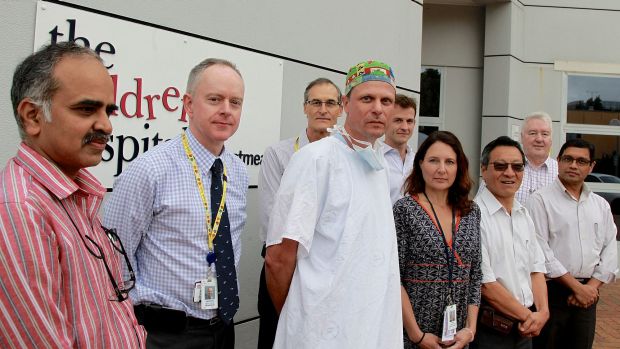
Surgeons and staff from the two major children’s hospitals in NSW are speaking out about a “crisis” in paediatric surgery. Photo: Ben Rushton
Desperate paediatric surgeons have taken the extraordinary step of writing an open letter to the state’s politicians begging them to fix a crisis in child surgery in NSW.
The surgeons say they have reached breaking point after years trying to get health authorities to stop the major specialist children’s hospitals from being swamped with surgeries that should be performed in local hospitals.
They say children and their families are suffering because they are being forced to travel too far for surgery, or face long delays because of the backlog.

Surgeons have been working inside the system for three years in an effort to fix the problem. Photo: Dallas Kilponen
“We are no longer willing to tolerate the current situation,” they write in the letter, obtained by Fairfax Media. “The children of NSW deserve better”.
The surgeons have been working inside the system for three years to have the problem fixed. But hours after receiving their letter, Health Minister Jillian Skinner told them she would intervene and accept their request for more doctors to be employed, and for a new system to be implemented to ensure surgeries are in local hospitals.
Labor has also agreed to fund the five additional surgeons.
The open letter, signed by the generalist paediatric surgeons for the Sydney Children’s Hospital network, which covers the Children’s Hospital at Westmead and the Sydney Children’s Hospital at Randwick, says despite numerous reports and warnings, and new guidelines released last year, the problem had not been fixed.
“It remains the case … that families have to travel to the children’s hospitals in order to receive surgical procedures that they should be able to access at their local hospitals,” the letter says. “Worse, this unnecessary demand on the services provided by the children’s hospitals is delaying the treatment of babies and children who really do need the … level of care that we provide”.
President of the NSW branch of the Australian Medical Association, Saxon Smith, said the specialist children’s hospitals had seen a vast increase in emergency surgeries, which had come at the cost of children needing treatment for conditions such as hernias.
“These are conditions that do impact on the children and their families, it’s uncomfortable and it’s distressing,” he said. “But there is just not enough time to do all the procedures that are required”.
In 2011, the deputy state coroner found an eight-year-old boy, Jacob Belim, had died after inappropriate diagnosis and treatment of a burst appendix that included delays of more than 7 hours when he was taken to his local hospital, which had a policy of not performing emergency paediatric abdominal surgery.
Tony Sara, president of the NSW arm of the Australian Salaried Medical Officers’ Federation, said the problem had emerged as surgery, anaesthetics and nursing had become increasingly specialised, with generalist services less likely to treat children.
But local hospitals had even been given more resources to ensure they would treat children after a major review into the state’s health system, known as the Garling Inquiry, noted their refusal was causing problems.
“But even though the money was allocated it has gone into other activities,” Dr Sara said. “In any system that’s under pressure if there are things you can squeeze that can’t fight back that’s what you are going to do”.
He said at the same time the numbers of procedures done in the specialist children’s hospitals had increased, as had the degree of complexity of those procedures, yet there had not been a corresponding increase in staff and resources.
“There didn’t seem to be a willingness [among health authorities] to accept it just might be that this particular area in hospital services needs more money,” he said.
Ms Skinner said if re-elected she would employ the five extra surgeons the doctors say must be hired to help deal with the increasing patient demand, as well as working with them to implement a “hub and spoke” model that will allow general paediatric surgery to be supported in other hospitals.
“We want routine paediatric surgery to be undertaken at the Local Health District level,” she said. “It will take some time to implement the hub and spoke model but we are committed to ensuring more children get timely surgery closer to home.”
Labor health spokesman Walt Secord said not only would Labor fund the doctors, but they would be complimented by previously announced commitments for a paediatric surgery centre at Campbelltown Hospital, which he said would help meet growing demand, and more than 100 paediatric nurses employed under new nurse-to-patient ratio rules.
“I’ve heard the warning siren activated by Sydney’s paediatric surgeons,” he said. “Make no mistake, we are investing in children’s health so they can have the best start in life.”
